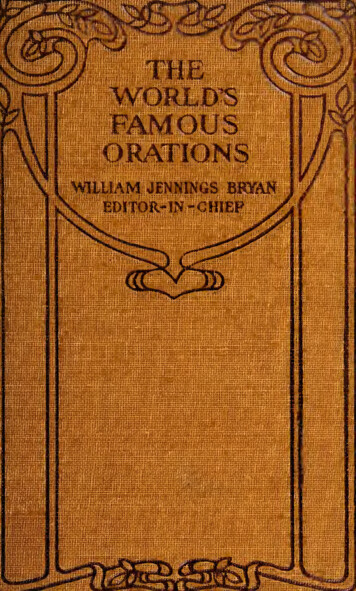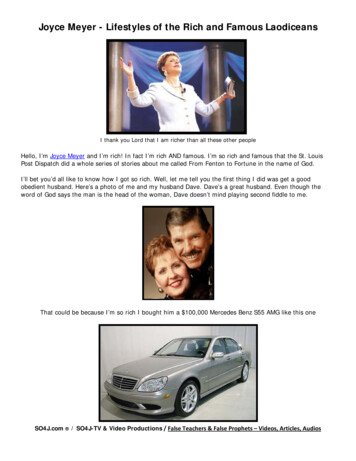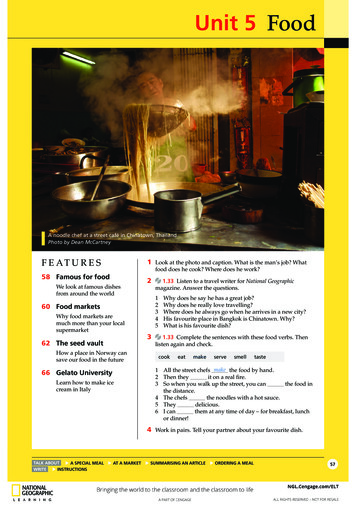
Transcription
EDITOR-IN-CHIEP
Digitized by the Internet Archivein 2019 with funding fromKahle/Austin orat0001brya
The World s Famous OrationsVOL. IGREECE432 B.C.-324 B.C.
THEWORLD’SFAMOUSORATIONS WILLIAM JENNINGS BRYANEDITOR-IN-CHIEFo 27 FRANCIS W. HALSEYASSOCIATE EDITOR-IN TEN VOLUMESVol. IGREECEFaNK /?2'WAGNALLS COMPANYNew York and London
Copyright.1906,byFUNK & WAGNALLS COMPANY[Printed in the United States of America]
PREFACEIt is now several years since I began to con sider the propriety of making a collection ofthe famous orations of the world for the benefitof students, and with that purpose in view, wher ever an opportunity offered, I have conferredwith men who were able and willing to giveadvice as to the selections. At first my intentionwas to use only enough orations for a singlevolume, but I afterward became convinced thatthe plan suggested to mm by the publishers ofthis collection woul" be a better one, namely:to select enough of the great orations to fill tenvolumes, but so to group them as to permit ofdivision into volumes arranged chronologicallyas to countries.In selecting the more unportant of the greatspeeches there is little room for the exercise ofV1G051B
PREFACEindependent judgment, for mankind has alreadypronounced verdicts which no editor can ignore.But outside of what may be called the acceptedmasterpieces, there has been some opportunityfor choice, and accordingly for this series orationshave been chosen which, considering the man,1the subject, and the occasion, were thought likelyto be the most useful to those who may desireto study history as portrayed in great forensicetforts.Despairing of finding the time to make thiscollection unaided, I gladly availed myself ofthe opportunity offered by the present publish ers to do the work in conjunction with Mr.Francis W. Halsey, whose wide experience haseminently fitted him for such an undertakinerHe collected a large amount of material alongthe lines above indicated and then submitted itto me for my approvalor rejection.Afterexamining the collection he had made, coveringthe history of oratory from the earliest Greeksto the present day, changes in the arrangementwere made by me, some of the orations werevi
PREFACEeliminated and others added.Mr. Halsey, Imay add, is entitled to the sole credit for oneinteresting feature of the collection as it stands—namely, the speeches of North American In dians.As these men were the first American ora tors, specimens of their eloquence deserve a placein these volumes.During my recent travels abroad I had manyopportunities to consult public men in regardto speeches of the orators of England, Ireland,Scotland and Continental Europe.In the com pilation of the work I have been placed underspecial obligations to the following public menof Europe, to whom I desire here to extend mythanks:Kt.Hon.Sir HenryCampbell-Bannerman,M. P., the British Prime Minister.Rt. Hon. Arthur J. Balfour, M. P., formerlyPrime Minister.The Earl of Rosebery, formerly Prime Min ister.Lord Loreburn (Sir Robert Reid), Lord HighChancellor of England.vii
PREFACERt. Hon. Joseph Chamberlain, M. P., formerlyColonial Secretary.Lord Robert Cecil, son of the late Marquis ofSalisbury.Rt. Hon. Winston Churchill, M. P., son of thelate Lord Randolph Churchill, and now Under secretary to the Colonies.Rt.Hon.Herbert Henry Asquith, M.P.,Chancellor of the Exchequer.Rt. Hon. Herbert J. Gladstone, M. P., son ofthe late William E. Gladstone, and now HomeSecretary.Rt. Hon. James Bryce, M. P., Chief Secretaryto the Lord Lieutenant of Ireland.John W. Redmond, Esq., M. P.John Dillon, Esq., M. P.John A. Bright, Esq., son of the late Rt. Hon.John Bright.Viscount Peel, grandson of Sir Robert Peel,Bt. and Speaker of the House of Commons,1884-95.C. P. Moberly BeU, Esq., Manager of theLondon Times. vm
PREFACEM. Georges Clemenceau, French Minister ofthe interior/Baron D’Estournelles de Constant, MinisterPlenipotentiary of France, member of the Courtof The Hague.Count Albert Apponyi, Leader of the NationalParty and formerly President of the HungarianHouse of Representatives.Franz Kossuth, son of the late Louis Kossuth,and now a deputy in the Hungarian House ofRepresentatives.William Jennings Bey an.Paris, Augusi 13, 1906.' Since the above waa written, M. Clemenceau (in October, 1906)has become Prime Minister of France.
INTRODUCTIONThe age of oratory has not passed; nor Avillit pass.The press, instead of displacing the ora tor, has given him a larger audience and enabledhim to do a more extended work.As long asthere are human rights to be defended; as longas there are great interests to be guarded; aslong as the welfare of nations is a matter fordiscussion, so long will public speaking have itsplace.There have been many definitions of eloquence.Daniel Webster has declared that it consists inthe man, in the subject, and in the occasion.Noone can question the troth of his statement.Without the man, the subject and the occasionare valueless, but it is equally true that, with out a great subject and a proper occasion, a manspeaks without effect.The speaker, moreover,is eloquent in proportion as he knows what heis talking about and means what he says.In
INTRODUCTIONother words, knowledge and earnestness are twoof the most important requisites of successfulspeaking. Vhile oratorical ability has, at times, mani fested itself in several generations of one family,it can not be said that heredity is an element ofimportance, for nearly all the great orators ofthe world have appeared with little or nothingin a preceding generation to give promise ofprominence.An orator is largely a product ofhis environment.One who is born into a greatconflict, or is surrounded by conditions whichcompel study and investigation, and who be comes enthused with a great purpose, soon at tracts attention as a speaker.He is listened tobecause he has something to say; because he him self feels he makes others feel.Because hejonceives that he has a mission, he touches and.moves those whom he addresses. Eloquent speechis not from lip to ear, but rather from heart toheart.While it is absolutely necessary for the oratoito master his subject and to speak with earnestXI
INTRODUCTIONBess, his speech can be made more effective bythe addition of clearness, brevity and apt illus trations.Clearness of statement is of very great impor tance.It is not sufficient to say that there arecertain self-evident truths; it is more accurateto say that all truth is self-evident.Becausetruth is self-evident, the best service that one canrender a truth is to state it so clearly that it canbe comprehended; for a truth once comprehendedneeds no argument in its support.In debate,therefore, one’s first effort should be to statehis own side so clearly and concisely as to makethe principles involved easily understood.Hissecond object should be so to divest his oppo nent’s argument of useless verbiage as to makeit stand forth clearly; for as truth is self-evident,so error bears upon its face its own condemna tion. Error needs only to be exposed to be over thrown.Brevity of statement also contributes to theforee of a speaker.It is possible so to enfolda truth in long-drawn-out sentences as practixii
INTRODUCTIONcally to conceal it.The epigram is powerful be cause it is full of meat and short enough to beremembered.To know when to stop is almostas important as to know where to begin andhow to proceed.The ability to condense greatthoughts into small words and brief sentencesis an attribute of genius.Often one lays downa book with the feeling that the author has “saidnothing with elaboration, ’ ’ while in perusing an other book one finds a whole sermon in a singlesentence, or an unanswerable argument couchedin a well-turned phrase.The interrogatory is frequently employed by theorator, and when wisely used is irresistible. Whatdynamic power, for instance, there is in thatquestion propounded by Christ, “What shall itprofit a man if he gain the whole world and losehis own soul?”Volumes could not have pre sented so effectively the truth that he sought toimpress upon his hearers.The illustration has no unimportant place inthe equipment of the orator.We understand athing more easily when we know that it is like rill
INTRODUCTIONsomething which we have already seen.Illus trations may be drawn from two sources—natureand literature—and of the two, those from na ture have the greater weight.valuable; all history is useful.All learning isBy knowing whathas been we can better judge the future; byknowing how men have acted heretofore we canunderstand how they will act again in similarcircumstances.But people know nature betterthan they know books, and the illustrationsdrawn from every-day life are the most effective.If the orator can seize upon something withinthe sight or hearing of his audience—somethingthat comes to his notice at the moment and as ifnot thought of before—it will add to the effect iveness of the illustration.For instance, Paul’sspeech to the Athenians derived a large part ofits strength from the fact that he called atten tion to an altar near by, erected ‘ ‘ to the UnknownGod,” and then proceeded to declare unto themthe God whom they ignorantly worshiped.Classical allusions ornament a speech, theirvalua being greater of course when addressed toXIV
INTRODUCTIONthose who are familiar with their source.Poetrycan often be used to advantage, especially whenthe sentiment is appropriate and is set forthin graceful language.By far the most usefulquotations for an orator, however, are thosefrom Holy Writ.The people are more familiarwith the Bible than with any other single book,and lessons drawn from it reinforce a speech.The Proverbs of Solomon abound in sentenceswhich aptly express living truths.Lincolnusedscripturequotationsquently and very powerfully.Abrahamveryfre Probably no Biblequotation, or, for that matter, no quotation fromany book ever has had more influence upon apeople than the famous quotation made by Lin coln in his Springfleld (Ill.) speech of 1858,—“A house divided against itself can not stand.”It is said that he had searched for some timefor a phrase which would present in the strong est possible way the proposition he intended toadvance—namely,that the nation could notendure half-slave and half-free.The object of public speaking usually is toXV
INTRODUCTIONpersuade.betweenSome one, in describing the differenceCiceroand Demosthenes,remarked:“When Cicero spoke people said: ‘How well Cic ero speaks!’ but when Demosthenes spoke theysaid, ‘Let us go against Philip.’ ”—the differencebeing that Cicero impressed himself upon theaudience, while Demosthenes impressed his sub ject upon them.Whether or not this compar ison be a fair one, it at least presents an im portant truth.It is a compliment to a publicspeaker that the audience should discuss what hesays rather than his manner of saying it; morecomplimentary that they should remember hisarguments, than that they should praise his rhet oric.The orator should seek to conceal himselfbehind his subject.If he presents himself inevery speech he is sure to become monotonous, ifnot offensive.If, however, he focuses attentionupon his subject, he can find an infinite numberof themes and, therefore, give variety to hisspeech.In reading great orations one not only learnssomething of the mental methods and style ofSVl
INTRODUCTIONthe orator, but obtains an epitome of the historyof the times.As each important speech is vir tually a product of the entire life of the speaker,so the speeches delivered at gi’eat crises in na tional history have been products of the condi tions that called them forth. Nowhere is so muchinformation crowded into the same number ofwords as in a memorable speech.The greatestof all the orations that have come down to usfrom the past is the one by Demosthenes, knownas “The Oration on the Crown,” which is in cluded in the volume on Greece in this series.possesses every requisite.ItIt is persuasive; it isargumentative, and the arguments are so skilfullyarranged as to produce the greatest effect; it isclear in statement; it is eloquent and containspassages that can not be surpassed in invective;and it abounds in definitions and distinctionswhich are as valuable to-day as when they wereuttered.The reader will note the appeal which De mosthenes made to the sense of justice, to whichall arguments should be addressed.rviiHe called
INTRODUCTIONattention at the beginning to the well recog nized fact that his own risk was greater thanthat of schines; for while the latter could, atmost, suffer some disappointment at failure in theprosecution, he (Demosthenes), if he lost wouldforfeit the regard of his people.And as he ap peared in his own defense, he reminded themthat people take more pleasure in hearing invec tive and accusations than in hearing a manpraise himself; and yet if he, himself, did notset forth the arguments to be made in his ownbehalf, he would be without defense.The definition which Demosthenes gives ofthe statesman is worth remembering.He says:“Yet understand me. Of what a statesman may ibe responsible for I allow the utmost scrutiny;I deprecate it not. What are his functions? Toobserve things in the beginning, to foresee andforetell them to others,—this I have done: again,wherever he finds delays, backwardness, ignoranee, jealousies, vices inherent and unavoidable in all communities, to contract them intothe narrowest compass, and, on the other hand,to promote unanimity and friendship and zeal \j\Ii'i:rviii:
INTRODUCTIONin the discharge of dutxj.performed.”AU this, too, I haveStatesmanship not only requires a knowledgeof the principles that control human beings, butit also requires moral courage.Demosthenesunderstood the demands upon a statesman andsatisfied his audience that he had been equal tothese demands.In the discussion of bribery Demosthenes pre sented a thought which may well be borne inmind:“But by refusing the price of cor ruption I have overcome Philip; for as theofferer of a bribe, if it be accepted, has van quished the taker, so the person who refuses itand is not corrupted, has vanquished the personoffering.”No one has ever thrown a strongerlight on the subject of bribery, or more accu rately stated the relation between the man whogives and the man who accepts a bribe.When I was a young man I bought a ten-vol ume set of orations in order to obtain one speech,and that speech was valuable to me because itcontained one sentence.The speech referred to
INTRODUCTIONwas the one by Pericles/ on those who had diedin the Peloponnesian War. The sentence reads:“It was for such a country then that these men,nobly resolving not to have it taken from them,fell fighting; and every one of their survivorsmay well be willing to suffer in its behalf.”Having described the glories of Greece and theadvantages of the government, he pointed outthat her people, recognizing the blessings of citi zenship, were willing to die rather than surren der those blessings.lie thus states, in a fewwords, the secret of a nation’s strength—.love ofcountry, justified by the government’s care forthe welfare of the people.One of the speeches of Socrates as reported byPlato contains a noble paragraph which rebukesthe worldly-minded of to-day.It presents alofty ideal of life and deserves to be committedto memory:“0 Athenians, I honor and love you; butI shall obey God rather than you; and as longas I breathe and am able I shall not cease study It will be found in volume one of this series,XX
INTRODUCTIONing philosophy and exhorting you and warningany one of you I may happen to meet, saying,as I have been accustomed to do, ‘ 0 best of men,seeing you are an Athenian of a city the mostpowerful and most renowned for wisdom andstrength, are you not ashamed of being carefulfor riches, how you may acquire them in greatestabundance, and for glory and honor, but carenot nor take any thought for wisdom and truth,and for your soul, how it may be made mostperfect?’ ”The speeches of Cicero rank next to those ofDemosthenes in their wealth of lessons to thestudent of oratory.All the vast learning ofthe great Eoman was used to illumine his foren sic efforts.The speech against Verres, whichwill I. found in the volume devoted to Eomanspeeches, is generally regarded as the one whichbest displays his varied talents.As my object has been to make this collectionas useful as possible, I have included the frag ments that have come down to us of the memora ble speeches of the Gracchi and the defense ofx-n
INTRODUCTIONhis own humble birth made by Caius Marius tothe people of Eome. The following from TiberiusGracchus gives a glimpse of the conditions thatcalled forth the eloquence of the Gracchi andshows also how largely a man’s work is shapedby the times in which he lives:“The wild beasts of Italy have their caves toretire to, but the brave men who spill their bloodin her cause, have nothing left but air and light.Without houses, without settled habitations, theywander from place to place with their wivesand children; and their generals do but mockthem when, at the head of their armies, they ex hort their men to fight for their sepulchers andthe gods of their hearths: for among such num bers, perhaps there is not one Roman who hasan altar that has belonged to his ancestors, or asepulcher in which their ashes rest. The privatesoldiers fight and die, to advance the wealth andluxury of the great; and they are called mastersof the world, without having a sod to call theirown. ’ ’More than one of those who peruse these vol umes may have had occasion to make a defensexxii
INTRODUCTIONsimilar to that of Mari s, but it is doubtfulwhether one better than his was ever offered.Itincludes the following words:‘ ‘ They despise my humbleness of birth; I con temn their imbecility. My condition is made anobjection to me; their misconduct is a reproachto them. The circumstances of birth, indeed, Iconsider as one and the same to all; but thinkthat he who best exerts himself is the noblest.If the patricians justly despise me, let them alsodespise their own ancestors, whose nobility, likemine, had its origin in merit. They envy me thehonor that I have received; let them also envyme the toils, the abstinence, and the perils bywhich I obtained that honor.”If space permitted quotations might be madefrom other speeches here given, for each has itsown distinctive merits.In Sheridan’s speech atthe trial of Warren Hastings, the reader will findsome excellent examples of invective.I mustquote a single passage from that speech:“If a stranger had at this time [in 1782] goneinto the kingdom of Oude, ignorant of whatXXlll
INTRODUCTIONhad happened since the death of Sujah Dowlah,that man who with a savage heart had still greatlines of character, and who with all his ferocityin war, had still with a cultivating hand pre served to his country the riches which it derivedfrom benignant skies, and a prolific soil—if thisstranger, ignorant of all that had happened inthe short interval, and observing the wide andgeneral devastation, and all the horrors of thescene—of plains unclothed and brown—of vege tation burnt up and extinguished—of villagesdepopulated and in ruin—of temples unroofedand perishing—of reservoirs broken down anddry—he would naturally inquire. What war hadthus laid waste the fertile fields of this oncebeautiful and opulent country ? What civil dis sensions have happened thus to tear asunder,and separate the happy societies that once pos sessed those villages? What religious rage had,with unholy violence, demolished those temples,and disturbed fervent, but unobtruding piety inthe exercise of its duties ? What merciless enemyhad thus spread the horrors of fire and sword?What severe visitation of Providence had thusdried up the mountains, and taken from the faceof the earth every vestige of green?—or rather,what monsters had crawled over the country.xxiy
INTRODUCTIONtainting and poisoning what the voracious ap petite could not devour?To such questions,what must be the answer ? No wars have ravagedthese lands and depopulated these villages—nocivil discords have been felt—no religious rage—no merciless enemy—no affliction of Providence,which, while it scourged for the moment, cut offthe sources of resuscitation—no voracious andpoisoning monsters—no; all this has been ac complished by the friendship, generosity andkindness of the English nation. They have em braced us with their protecting arms—and, lo,these are the fruits of their alliance.”There is much that the public speaker canstudy to advantage in the orations of Burke,O’Connell and Gladstone.The parliamentarystruggles of Great Britain and Ireland havenaturally resulted in the development of manymasters in the art of speech, but the nations ofContinental Europe have not been overlooked inthe selections here made.It has been the inten tion to give both sides in every contest fairly.The speech of JEschines against Demosthenes isgiven, as well as the unrivaled defense offeredXXV
INTRODUCTIONby the greatest orator of ancient Greece.Cic ero’s speech against Catiline is accompanied byextracts from the speeches of Catiline.So, too,are given the speeches of Cfesar and Cato forand against the punishment by death of theCatiline conspirators.The same rule has been followed in Englishand American politics.Particular care has beentaken to present both sides of a great contro versy in the speeches of representative men.Burke, Chatham and Mansfield represent thedivided English sentiment in the American Eevolution; Pitt and Fox, English sentiment as totreating with Napoleon as First Consul; Glad stone and Beaconsfield, their respective partiesin England’s own affairs; while Mr. Chamberlain speaks for the conservative government re cently overthrown; and Sir Henry CampbellBannerman outlines the policy of the new Lib eral government.I have thought it wise to include by his per mission, as representing the present Prime Min ister still further, the speech delivered by Sirxxvi
INTRODUCTIONHenry at the opening of the recent London ses sion of the Interparliamentary Union.Thatspeech is not only characterized by lofty ideas,but presents a strong argument in favor of peaceand moreover it contains one of the most thrill ing sentences uttered by a statesman in officein modern times.Representatives of the RussianDuma were present at this session of the Inter parliamentary Union, but the Duma had beendissolved after they left home.In referring tothe fact that this dissolution had been accom panied by the -promise of a new election, thePrime Minister paraphrased a sentence longused in reference to Kings and Emperors anddeclared, “The Duma is dead; long live theDuma.”The audience which was then assem bled in the Royal gallery of the British Houseof Lords rose as one man, the cheers indicatingthat the speaker had touched a responsive chord.It has been impossible to include in threevolumes all the American orations which mightbe deemed worthy of a place, but important pe riods have been covered, and the main issuesXKVll
INTRODUCTIONpresented.Hearing is given to Jefferson, and tohis political opponent Hamilton, the two repre senting opposite schools of political thought. Thespeeches of Webster and Hayne, on the right ofa state to secede, are given, as well as speechesfrom Webster, Clay and Calhoun on the Com promise of 1850.The slave issue is definedby its ablest representatives.For example, thespeech of Charles Sumner which provoked theassault of Preston Brooks and the speech ofBrooks in justification of himself have been in cluded.We have been careful to reproduce thespeeches made in the first of the series of jointdebates in Illinois between Lincoln and Doug las which are the most celebrated political de bates in history.The subject of the debatewas one which stirred the nation to its verydepths, and the participants became only twoyears later, opposing candidates for the highestoffice within the gift of the people.As orators the two men were well matched,althotheywereentirelydifferentinstyleand method; they spoke to immense crowds, andxxviii
INTRODUCTIONtheir speeches were accepted as the best state ments of their respective sides.Lincoln had anadvantage, in that he could oppose the principleof slavery without threatening interference withit where it already existed under the Constitu tion; and yet so strong was Douglas’s presenta tion that he defeated Lincoln in the senatorialcontest then pending, only to be defeated by himtwo years later in the contest for the Presidency.Every student of oratory should secure a com plete copy of the debates between these twogiants.The debate selected for this collectionbeing the first (the one at Ottawa), gives a fairexample of the oratory of each.The first inau gural address of Lincoln and the farewell ad dresses of Jefferson Davis and Robert Toombswhen they withdrew from the Senate reflect theattitude of the North and South at that time.The tariff question is discussed in the speechesof Speaker Crisp, and ex-Speaker Reed, each awell-equipped champion of his party, while themoney question finds worthy exponents in Sen ator John Sherman and Congressman RichardXXIX
INTRODUCTIONP. Bland, who for nearly twenty years were theleaders of the opposing forces on this subject.AmongtheAmericanorationsisonebythe great historian, Bancroft, on ‘ The people in‘Art, Government and Eeligion.”So far as myreading goes, this is the most splendid tributeever paid to the common people in an oration.It is full of sentences that could be quoted astexts.Only two living American orators have beenincluded—thesebeingex-PresidentClevelandand President Roosevelt, who are in a class bythemselves.By his permission, Mr. Cleveland’sfirst inaugural address and his remarks to thestudents of Princeton University on the assas sination of President McKinley are given. Presi dent Roosevelt is represented by his inauguraladdress and by his speech at the Mothers’ Con gress, the selection of the latter having beenmade after consultation with him.William Jennings Bryan.Paris, August 13, 1906.3nnc
CONTENTSVoL.I—GrBEECE (432 B.C.—324 B.C.)Preface .IntroductionAchillesPage .His Reply to the Envoys (Legen Jary).3Pericles—I In Favor of the PeloponnesianWar (432 B.C).9II On Those Who Died in the War(430 B.C.).16III In Defense of Himself (430 B.C.)27Cleon—On the Punishment of the Mytdeneans(427 B.C.).34Alcibiades—I In Support of the Athenian Ex pedition to Sicily (414 B.C.)41II To the Spartans (413 B.C.) .47Nicia-s— Against the Sicilian Expedition (414B.C.).49Hermocrates—On the Union of Sicily AgainstInvaders (416 B.C.)Lysias—Against Eratosthenes (403 B.C.).X-VV?.5561
CONTENTSPageSocrates—I In His Own Defense (399 B.C.)II On Being Declared Guilty65(399B.C.).77III OnBeingCondemned toDeath(399 B.C.).82Isocrates—Onthe Union of Greece to ResistPersia (380 B.C.).89ISAEUS—Inthe Suit Against Dicseogenes andLeochares.101Demosthenes—IThe Second Oration AgainstPhilip (344 B.C.).noII On the State of the Chersonesus (342 B.C.) .120III On the Crown (330 B.C.).143Aeschines—AgainstCtesiphon;Crown (330 B.C.)Dinarschus—Againstor,Onthe.186Demosthenes (324 B.C.) .233xxxii
VOL. IGREECE432 B.C.—S84 B.G.
ACHILLESHIS REPLY TO THE ENVOYS'(LEGENDARY)Date of Homer’s birth and death unknown, but 800 to 900 B.C. theperiod usually accepted. Of the seven cities contending for thehonor of having been his birthplace, Smyrna possesses the bestevidence. Many critics contend that the poems bearing Homer’sname were written by various persons in different ages, but it isprobable that at least the Iliad, or a considerable part of it, wasthe product of a single mind.Heaven-sprung son of Laertes, Odysseus ofmany wiles, in openness mnst I now declareunto yon my saying, even as I am minded andas the fulfilment thereof shall be, that ye maynot sit before me and coax this way and that.For hateful to me, even as the gates of hell,is he that hideth one thing in his heart anduttereth another; but I will speak what meseemeth best. Not me, I ween, nor the otherDanaans, shall Agamemnon, son of Atreus, per suade, seeing we were to have no thank for bat tling with the foeman ever without respite. Hethat abideth at home hath equal share with himthat fightest his best, and in like honor are held’ Addressed more particularly to Odysseus, one of the envoys,than to Phoinix and Ajax, the others. These envoys had been sentby Agamemnon to plead with Achilles for his return to action inthe war against Troy. The Lang, Leaf and Myers translation.Printed by arrangement with Macmillan & Co. of London.3
THEWORLD’SFAMOUSORATIONSboth the coward and the brave; death comethalike to the untoiling and to him that hathtoiled long.Neither have I any profit for that I enduredtribulation of soul, ever staking my life in fight.Even as a hen bringeth her unfledged chickenseach morsel as she winneth it, and with herselfit goeth hard, even so I was wont to watch outmany a sleepless night and pass through manybloody days of battle, warring with folk for theirwomen’s sake. Twelve cities of men have I laidwaste from shipboard, and from land eleven, Ido you to wit, throughout deep-soiled Troy-land;out of all these took I many goodly treasures, andwould bring and give them all to Agamemnon,son of Atreus, and he staying behind amid thefleet ships would take them and portion out somefew but keep the most. Now, some he gave tobe meeds of honor to the princes and the kings,and theirs are left untouched; only from me ofall the Achaians took he my darling lady andkeepeth her—let him sleep beside her and takehis joy.But why must the Argives make war on theTrojans? Why hath Atreides gathered his host d led them hither? Is it not for lovely-hairedHelen s sake ? Do then the sons of Atreus aloneot mortal men love
Lincoln used scripture quotations very fre quently and very powerfully. Probably no Bible quotation, or, for that matter, no quotation from any book ever has had more influence upon a people than the famous quotation made by Lin coln in his Springfleld (Ill.) speech of 1858,—- "A house divided against itself can not stand."










